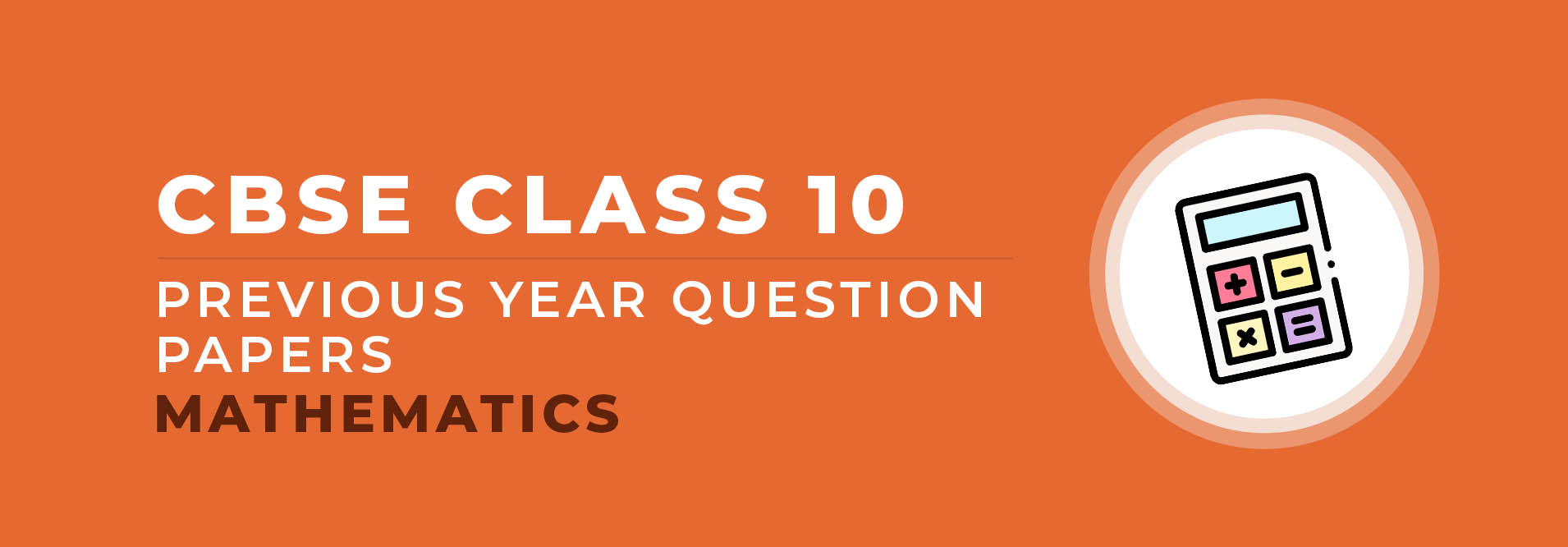CBSE Previous Year Question Papers Class 10 Maths – Download Free PDF
Preparing for the CBSE Class 10 Maths exam can be a challenging task, especially for students aiming to score high marks. One of the most effective ways to prepare is by practicing previous year question papers. These papers serve as a blueprint, providing valuable insights into the exam’s structure, types of questions, and level of difficulty.
CBSE Class 10 Maths Question Papers (Year-wise)
- CBSE Class 10 Math Question paper 2024
- CBSE Class 10 Math Question paper 2023
- CBSE Class 10 Math Question paper 2022
- CBSE Class 10 Math Question paper 2020
- CBSE Class 10 Math Question paper 2019
Related Resources
- CBSE Class 10 Maths Chapter-Wise Notes
- CBSE Class 10 Maths Syllabus
- CBSE Class 10 Maths Important Questions
Why Practice Maths Previous Year Question Papers?
- Understand the Exam Pattern
- Previous year question papers reveal the structure of the CBSE Maths exam.
- Students get familiar with the distribution of marks across sections (e.g., Algebra, Geometry, Trigonometry, etc.).
- It helps students anticipate the weightage of different topics, enabling more focused preparation.
- Learn the Marking Scheme
- Understanding how marks are distributed for each question type (e.g., 1-mark, 2-mark, 4-mark, and 6-mark questions).
- Students can tailor their answers to maximize marks by providing to-the-point solutions.
- Time Management Skills
- Solving these papers in a timed environment replicates the real exam scenario.
- It helps students gauge how much time they should allocate to each section.
- Regular practice ensures that students can complete their paper on time with confidence.
- Identify Repeated Questions and Important Topics
- Analyzing multiple question papers often reveals patterns in the types of questions asked.
- Frequently tested concepts can be prioritized during revision.
- Boost Confidence and Reduce Anxiety
- Familiarity with question trends reduces uncertainty and nervousness on the day of the exam.
- Regular practice improves accuracy and builds a sense of preparedness.
- Improve Problem-Solving Skills
- Maths requires strong analytical and problem-solving abilities.
- Practicing different types of problems sharpens these skills, especially for tricky sections like Trigonometry and Mensuration.
Key Advantages at a Glance
| Advantage | How it Helps Students |
| Exam Pattern Familiarity | Understand the format, question distribution, and marking scheme. |
| Topic Weightage Analysis | Focus on high-weightage chapters like Algebra, Geometry, and Probability. |
| Time Management | Learn to pace yourself and avoid running out of time. |
| Trend Recognition | Spot recurring questions and important concepts from previous papers. |
| Stress Reduction | Practice lowers anxiety by providing a clear idea of what to expect in the real exam. |
| Error Analysis | Identify mistakes and avoid repeating them in the actual exam. |
Tips for Using Maths Previous Year Papers Effectively
- Simulate Exam Conditions: Attempt the paper in one sitting without interruptions, adhering to the official time limit (3 hours).
- Review Mistakes: After solving, analyze your errors and revise the concepts where you struggled.
- Track Progress: Maintain a record of your scores and time taken for each paper to observe improvement over time.
- Practice Solutions: Write step-by-step solutions for long-answer questions, as CBSE exams award marks for steps.
- Plan Revisions: Use insights from these papers to design your revision plan, focusing on weak areas.
Benefits of Solving Maths Previous Year Question Papers
Practicing previous year question papers is an indispensable part of effective preparation for the CBSE Class 10 Maths exam. These papers provide a realistic glimpse of the actual exam and help students refine their strategy and skills. Let’s delve deeper into the benefits:
- Enhances Exam Preparedness
- Simulated Practice: Solving past papers mimics the actual exam environment, making students more comfortable with the process.
- Real-Time Evaluation: It helps assess current knowledge and preparedness, highlighting strengths and areas needing improvement.
- Structured Revision: Regular practice ensures all topics are covered systematically before the exam.
- Familiarizes Students with Question Trends and Frequently Asked Concepts
- Question Trends: Analyzing papers from previous years reveals commonly tested concepts and frequently repeated question types.
- Understanding Key Topics: Students can prioritize high-weightage chapters like Algebra, Trigonometry, and Geometry for focused preparation.
- Exposure to Variability: These papers expose students to the variety of question formats, including MCQs, short-answer, and long-answer questions.
- Improves Speed and Accuracy
- Time Management Skills: By timing themselves while solving these papers, students learn to pace their answers effectively and avoid rushing during the exam.
- Accuracy in Calculations: Repeated practice sharpens calculation skills, reducing silly mistakes.
- Step-Wise Approach: Practicing step-by-step solutions ensures precision and helps earn partial marks for partially correct answers.
- Builds Confidence for the Final Exams
- Eliminates Fear of the Unknown: Familiarity with the exam structure and types of questions instills confidence.
- Boosts Problem-Solving Ability: Tackling a variety of questions improves logical thinking and problem-solving skills.
- Reduces Exam Anxiety: Students feel more prepared and less stressed when they know what to expect.
Key Benefits at a Glance
| Benefit | How It Helps |
| Exam-Like Practice | Simulates real exam conditions, ensuring readiness. |
| Question Trends Recognition | Highlights important concepts and repeated questions. |
| Enhanced Speed and Accuracy | Improves calculation precision and ensures timely completion of the paper. |
| Confidence Boost | Reduces stress and builds a positive mindset for tackling the exam. |
| Improved Time Management | Trains students to allocate time effectively for all sections. |
| Identification of Weak Areas | Pinpoints topics that require extra attention during revision. |
Tips to Maximize the Benefits
- Start Early: Begin solving papers at least 2-3 months before the exam for thorough preparation.
- Analyze Thoroughly: After solving, review incorrect answers to identify and fix conceptual gaps.
- Revise Regularly: Revisit difficult questions to reinforce understanding and boost retention.
- Use Solution Guides Wisely: Attempt questions independently before referring to the solutions to strengthen problem-solving skills.
How to Use These Papers Effectively
Practicing previous year question papers is a proven way to enhance preparation, but to maximize their benefits, students must approach them strategically. Here’s a detailed guide on how to use these papers effectively:
- Allocate Specific Time Slots for Practice
- Set a Schedule: Dedicate fixed hours each day or week exclusively for solving previous year question papers.
- Divide by Topics or Full Papers: Initially, solve topic-specific sections to strengthen weak areas, and later transition to full papers for comprehensive practice.
- Stay Consistent: Stick to the schedule to make regular progress and build confidence over time.
- Tip: Avoid distractions during this time to maintain focus and treat it as a real exam.
- Solve Papers in a Simulated Exam Environment
- Mimic Exam Conditions: Create a quiet workspace, keep a clock or timer, and strictly follow the CBSE exam duration (3 hours).
- Avoid Help: Do not use textbooks, notes, or online resources while solving the paper.
- Use Proper Stationery: Practice with the same tools (pen, ruler, calculator for specific problems) you plan to use during the exam.
- Benefits:
- Improves time management.
- Trains the mind to stay focused for extended durations.
- Familiarizes students with the pressure of completing the paper on time.
- Analyze Mistakes and Review Concepts Regularly
- Immediate Review: After completing the paper, check answers thoroughly using an answer key or solution guide.
- Categorize Mistakes:
- Conceptual Errors: Revise the topic to strengthen understanding.
- Calculation Errors: Practice similar problems to improve accuracy.
- Time Management Issues: Work on pacing strategies for different sections.
- Maintain a Record: Create a table to log mistakes and concepts that need improvement for future reference.
- Practice the Same Paper Multiple Times to Track Improvement
- First Attempt: Solve without external help to assess initial performance.
- Second Attempt: After reviewing and correcting mistakes, reattempt the same paper to reinforce concepts.
- Subsequent Attempts: Continue practicing the same paper over time to track progress in speed, accuracy, and confidence.
- Benefits:
- Improves retention of concepts.
- Reduces the likelihood of repeating mistakes.
- Boosts confidence as scores improve with each attempt.
Step-by-Step Action Plan for Effective Use
- Start with Recent Papers: Solve the latest question papers first, as they reflect the current syllabus and exam pattern.
- Move Chronologically Backwards: Once comfortable with the latest papers, tackle older ones to cover a wider variety of questions.
- Focus on Weak Areas: Spend extra time on challenging topics or repeated mistakes.
- Combine Papers with Study Materials: Refer to NCERT textbooks or notes when you struggle with specific questions.
- Monitor Your Progress: Keep track of scores, time taken, and improvement after each paper.
Key Benefits of This Approach
| Step | Benefit |
| Allocate Time Slots | Ensures consistent practice and discipline. |
| Simulate Exam Environment | Reduces exam-day anxiety and builds confidence. |
| Analyze Mistakes and Review Concepts | Strengthens weaker areas and reduces errors. |
| Reattempt Papers | Reinforces learning and boosts speed and accuracy. |
We want to ensure that students make the most of this valuable resource and stay updated as new content is added. Here’s how they can stay connected and never miss an update:
- Bookmark This Page
- Why Bookmark?
- Quickly access the question papers whenever needed.
- Stay informed about newly added content, such as updated question papers or solutions.
- Bookmark this page now and access CBSE Class 10 Maths previous year question papers anytime with just one click!
- Why Bookmark?
- Sign Up for Updates
- Benefits of Signing Up:
- Be the first to know when new question papers or solutions are uploaded.
- Get exclusive tips, study material, and preparation guides straight to your inbox.
- Stay informed about important CBSE updates and resources.
- Benefits of Signing Up:
- Share with Friends
- Why Share?
- Help peers prepare better for exams.
- Create a collaborative learning environment by discussing solutions together.
- Share this page with your friends and help them excel in CBSE Class 10 Maths too! Together, let’s make preparation easier and more effective.
- Why Share?








Get Social